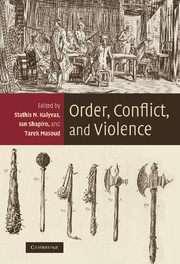Book contents
- Frontmatter
- Contents
- List of figures
- List of tables
- List of contributors
- Preface
- 1 Introduction: integrating the study of order, conflict, and violence
- Part 1 Creating, maintaining, and restoring order
- Part 2 Challenging, transforming, and destroying order
- 8 Civil wars and guerrilla warfare in the contemporary world: toward a joint theory of motivations and opportunities
- 9 Clausewitz vindicated? Economics and politics in the Colombian war
- 10 Articulating the geo-cultural logic of nationalist insurgency
- 11 Which group identities lead to most violence? Evidence from India
- 12 Order in disorder: a micro-comparative study of genocidal dynamics in Rwanda
- 13 Sexual violence during war: toward an understanding of variation
- 14 “Military necessity” and the laws of war in Imperial Germany
- 15 Preconditions of international normative change: implications for order and violence
- 16 Promises and pitfalls of an emerging research program: the microdynamics of civil war
- Index
- References
9 - Clausewitz vindicated? Economics and politics in the Colombian war
Published online by Cambridge University Press: 06 July 2010
- Frontmatter
- Contents
- List of figures
- List of tables
- List of contributors
- Preface
- 1 Introduction: integrating the study of order, conflict, and violence
- Part 1 Creating, maintaining, and restoring order
- Part 2 Challenging, transforming, and destroying order
- 8 Civil wars and guerrilla warfare in the contemporary world: toward a joint theory of motivations and opportunities
- 9 Clausewitz vindicated? Economics and politics in the Colombian war
- 10 Articulating the geo-cultural logic of nationalist insurgency
- 11 Which group identities lead to most violence? Evidence from India
- 12 Order in disorder: a micro-comparative study of genocidal dynamics in Rwanda
- 13 Sexual violence during war: toward an understanding of variation
- 14 “Military necessity” and the laws of war in Imperial Germany
- 15 Preconditions of international normative change: implications for order and violence
- 16 Promises and pitfalls of an emerging research program: the microdynamics of civil war
- Index
- References
Summary
[War] … is a true chameleon … because it changes its nature a little in each concrete manifestation.
von ClausewitzIntroduction
What is war? Until relatively recently, the answer was coined almost invariably in Clausewitzian terms (von Clausewitz 1982): the continuation of politics by other (violent) means. Then, two new notions challenged – apparently with success – the Clausewitzian canon, at least in regard to civil wars. On the one hand, Mary Kaldor (2001) described contemporary civil conflicts as “new wars” that exhibited a distinct set of features – rent-seeking, strong links with criminal networks, violence against civilians, etc. War, thus, is not what it used to be. “Modern conflict … challenges the very distinction between war and peace. It takes place typically not between armies, or even between an army of a state and its armed opposition in some easily defined guerrilla movement. The forces of both government and opposition, from Cambodia to Colombia, blend into illicit business and organized crime” (Cairns, quoted in Azam 2002, 131). On the other hand, rational-choice theorists came to the conclusion that, as Keen (2000) has aptly put it, “war is the continuation of economy by other means.” Individuals join insurgent groups as maximizers of expected utility, and those (the groups) offer selective incentives to lure the military “work force” into them.
- Type
- Chapter
- Information
- Order, Conflict, and Violence , pp. 219 - 241Publisher: Cambridge University PressPrint publication year: 2008
References
- 8
- Cited by



